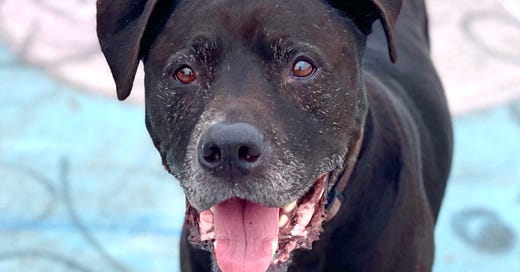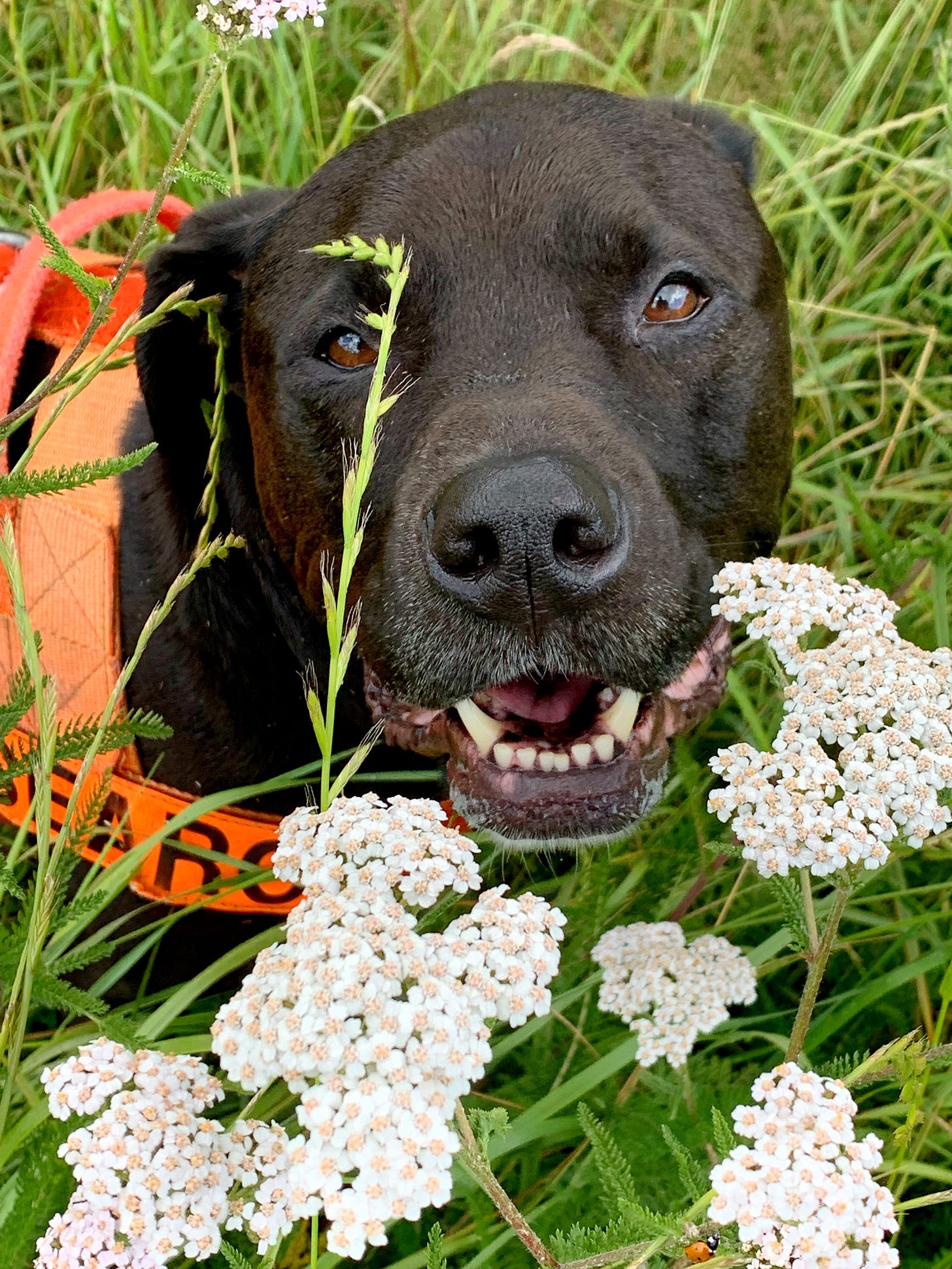Is Mu the World’s Best Cat Detection Dog?
I think so, but there is no way of knowing for sure.
Is Mu the Greatest Cat Detection Dog in History?
I asked ChatGPT, which is famous for being wrong sometimes, who was the best cat-detection dog in the world. It gave me the name of a dog who has found 150 cats. Mu has found more than 300 lost cats in his career. I don’t know the exact numbers, but I’m certain he has gone on more than 1200 searches in his 12 year career and found at least 300 cats. Comparing one dog to another isn’t always easy or straightforward because there isn’t a standardized measure. For one thing, a dog’s success rate can depend on which cases the dog’s handler chooses to take on. If a handler only accepted searches with a high chance of success, it would be reflected in the overall success rate, probably. In many cases, I advised people not to hire Mu for a search because the odds of success were low. Quite often, they wanted to try the search dog even if the chances were low, thinking, a low chance is better than not using the search dog at all. This affected his lifetime stats. Of course, I think Mu is the best search dog in the world because I love him.
I am not making this claim, but it is certainly possible that I might be one of the best in the entire world at my profession. I certainly try to be. Finding lost pets is a profession that most people haven’t even heard of, so, even if I might be the best in the world, it’s not like the top universities have been cranking out graduates in the field of Lost Pet Rescue, although I wish they would. I have no way of knowing because it’s not an easy thing to look up, or even to quantify. I wish there was an objective measurement that would tell me how I am doing and how I can improve. I am always working to improve my skills and do better, learning from our experience. If you wanted to know who is the fastest person in the world to run 400 meters, you can put them on the same track and let them race each other. I have spent far more than 10,000 hours playing chess, trying to improve. I probably have a rating of around 1600 to 1800. Despite my quest to be proficient in chess, millions of people are better than me. I’m sure there is a 10-year-old who could beat me in chess in 2 minutes while not even really paying attention. For people who find lost cats and dogs, there isn’t an equivalent competition or standardized test, although possibly there could be someday. Even then, the environment for finding lost pets in Seattle is going to be different than finding a lost cat or dog in London or Sydney or Iceland. Probably, it will never be known who is doing this work in the best possible way.
As far as a success rate, it’s not so easy to just publish a number saying we found the lost cat or dog X percent of the time. When people ask my success rate, I tell them that my search dogs, Mu, Tino, Raphi, Kelsy, Fozzie, and Karma, have pinpointed the current location of a lost cat or dog about 25% of the time in more than 3,000 searches conducted over the past 16 years. However, a search dog’s basic success rate might not be an accurate reflection of his skills. I have not found concrete numbers for any of the people who do the work I do, and even if there were specific numbers, it wouldn’t necessarily mean that the measurements were accurate or comparable. There have been dozens of times when one of my search dogs found a cat or dog and saved that animal’s life, in a very clear and unambiguous sense, and that cat or dog absolutely would not have been found by other means. Whatever the actual success rate might be, there have been some successes that justify the use of a search dog regardless of the official percentages.
I can say, beyond a shadow of a doubt, that if your cat or dog is missing in the Seattle-Tacoma-Everett area, your best bet would be to contact us for help. Three Retrievers Lost Pet Rescue is the only service in this area offering a search dog for a lost cat or dog, that I am aware of, at this time. There are companies from out of the area that might bring a search dog here, but I have seen no indication that they offer a better service or higher rate of success. It isn’t an easy thing to evaluate. There is, definitely, one person who does bring search dogs to the area sometimes, and I definitely would not recommend him, based on what I have heard from the people who hired him. If you were just going to get a consultation, and not a search dog, I would still be your best bet, even though theoretically someone could give you advice from anywhere in the world. Having done searches all over King, Pierce, Kitsap, and Snohomish counties, I am familiar with the terrain, the predators, the conditions, and I have probably been in your neighborhood before, conducting a search.
I would like to know if I am the best in the world, not because I want a gold medal, or because I want bragging rights. I want to know if someone is quantitatively or qualitatively doing this work better than me because, if they are, I would like to learn from that person’s work. I always want to do better. I know there are several areas where I could do better, and I am working on these. For one thing, I could keep more complete and accurate records. I know that Mu went on more than 1200 searches, and he located the lost cat or the cat’s remains more than 300 times. I wish I had kept detailed and complete records so I could say exactly what his success rate is. For Raphael, who has taken over since Mu retired, I am keeping complete records, so far. In 50 searches over the first 21 months of his career, he has found the cat 13 times, we think. Sometimes we can’t say 100% that Raphael found the cat. For example, in one case I was working Raphi at the same time I was using an app to track the cat’s AirTag. The app and the search dog found the lost cat at the exact same time. Raphi definitely found that cat, fair and square, without technical assistance, but the cat could have been found by the AirTag alone. How do I log that in Raphael’s spreadsheet? Of the times that Raphael found remains or evidence of an attack, we did not prove beyond a shadow of a doubt that the remains were of the missing cat, via DNA testing. It certainly was the most logical explanation for finding the remains of a cat of a similar color in the area where the cat was last seen,
There are other things I think I could do to improve at my job. For one, there have been many times when it would have been very helpful to know Spanish or Chinese. Another way I could be more competent at my job is if I were able to carry my 100-pound search dog for miles if he were injured. I think I probably could carry 75-pound Raphael, for a long way, if needed, but Tino is a challenge. I hope that someday drones become more useful for searching for lost pets. I would like to someday start a forensics lab just for analyzing evidence in the search for lost pets. That seems a long way off.
Every time I consult with the owner of a lost pet, every time that the search dogs go out, every time I set a trap for a dog or a cat, I always look for ways to improve. The one way that I have been striving to improve for years, and failing, is to find a way to get the message out about loss prevention. I have the solution to so many of these problems we are working to solve, if only I could get people to read my articles on loss prevention and take them seriously. But I will keep trying.
One way I have found that helps me improve is to teach others. I find that explaining my methods and reasoning to others helps me refine them. I also want to teach other people to do this work because I want someone to do the job much better than I am currently. I want someone to take what I know and build on it. I will probably do this work another 11 years, long enough to get Raven started in her search career and for her to search for 10 full years. I think Raven will be the most successful search dog I have ever worked with, if she doesn’t kill me first. After Raven and Raphael are ready to retire, I’m sure I will be ready to rest. I would like someone very qualified and dedicated to take my place. I hope education and technology would make lost pets a thing of the past, someday in the future, but it seems like services like ours will always be needed.
Also, the most common complaint I get is that I’m not available. I get way more requests for help than I can keep up with. I want to train people so that we can simply try to meet the huge demand for lost pet rescue. People get angry with me when I can’t help them. I understand it’s an emergency, and their family member is missing. I truly wish I could help everyone.
Please consider taking my course on Lost Pet Rescue so you can help meet the demand for services. I hope you will also take the course and do the work with an eye towards someday being better at this job than I am. Cats and dogs deserve the best, fastest, most competent help possible when they go missing. The next class may start August 12th, if enough people are interested and we can work out the logistics. Please join the Facebook group about the class for more information.
I would also like you to take this training so that you can have a relationship with a search dog. It is a bond unlike anything you may have experienced. To work with a search dog like Mu is a rare privilege. Mu was an unwanted mutt that I bought for $100 to get him away from a life of abuse and neglect. Then he went on to become the best search dog in history, as far as we know. I hope someday you can have a dog like Mu.






I'm not fit enough to be running around looking for lost pets, but I try to do my part by educating friends and acquaintances (and anyone who will listen), about how simple it is to take steps to prevent losing their pets. I know from personal experience how horrible it is to lose a dog or cat, and try to get others to understand, and to not take anything for granted. Thanks for all the work you do!
Excellent article and so very important.